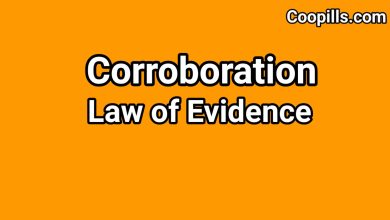Fact In Issue
In this article we shall be looking at fact in issue.

Table of Contents
What is Fact?
Under the provision of the evidence Act, S.258(1) of evidence Act, 2011 a fact include:
(a) anything, state of things or relation of things capable of being perceived by the senses; and
(b) any mental condition of which any person is conscious.
Under the Act, a fact is said to be “Proved” when after considering the matter before it, the vourt either believes it to exist or considers its existence so probable that a prudent man ought, in the circumstances of a particular case, to Act upon the supposition that it does exist. S.121 (a).
“disproved” when after considering the matter before it the court either believes that it does not exist, or considers its non-existence so probable that a prudent man ought, in the circumstances of the particular case, to act upon the supposition that it does not exist. S.121.(b).
“not proved” when it is neither proved nor disproved, a fact is said to be not proved. S121(c).
A fact should be distinguished from law. A Court of law is presumed to know the law since the rule of law could be shown to exist by making references to the statute which enacted it or to the desition of court l which embodies it or to relevant authoritative textbook.
Opinion differ from fact. Opinions are formed by individual persons on facts. Opinions are subjective because they vary from person to person on the same facts. Relative to its nature, opinion of a witness is not allowed to be given in evidence (note exception in expert opinion).
It is the function of the court to form its opinion as to the effects of facts adduced before it. But, the opinion of the court must be based on the facts before it; it is not allowed to being in extraneous matter.
What is an argument?
It is used in the process of proof of one fact from another or other facts. The relationship between argument and facts is that evidence provides fact upon which arguments are based. Arguments in legal proceedings are used to persuade the court to accept the case of a party as being true and correct.
Argument involve drawing right inference form fact proved as well as drawing legal implication or conclusions from those fact and inferences.
General classification
The term fact apply generally to whatever is the subject of perception or consciousness. The term, when in use in the law of evidence must be differentiate from its meaning in usage.
What is Fact in issue
These are fact necessary in order to prove or disprove, to establish or refute a case. Facts in issue therefore are those necessary by law for the plaintiff in civil case to establish his claim and those the Defendant must prove in
order to make out his defence. Fact in issue are those which by the pleadings are in disputes (As.4 & 5 E.A. 2011).
Under the Act, a fact in issue seems to seems to mean any fact which:
a. A party must prove to establish his case or defence
b. Affects the credibility of any witness or the admissibility of any piece of evidence. See Olufosoye V. Olorrunfemi (1989) I NWLR (pt.95) 26, the supreme court held that an admitted fact is not in issue. It is only when facts are in dispute that they said to be in issue.
Generally, fact in issue are determined by substantive law and in civil cases, by pleadings also. In criminal cases, the charge takes place of pleadings and the facts in issue are those ingredients of the offence which must be established or proved by the prosecution in order to sustain the charge and those to be proved by the accused to sustain any defence to the charge.
iii. Relevant Facts S.1
A fact in issue must be established, by fact which the Act regard as relevant. After times what sounds logically relevant may not be relevant to fact in issue, hence the need to follow the rules laid down by the Act, ie. Only evidence which the Act declares relevant is admissible to prove a fact. Evidence of other occurrences which merely tend to deepen suspicion is thus not admissible. See Harris DPP (1952) A.C. 708.
If A sues B for trespass to A’S land; evidence of possession of the land by A, the wrongful entry on the land by B, the fact that B has no legal reason for entering there on are relevant. Evidence of A’s inability to pay his water rates or NEPA bills are not relevant to the fact in issue and therefore cannot be admitted.
Relevancy and Admissibility
Generally, fact in issue often referred to as “logically probative facts” pertain to facts from which facts in issue or relevant fact may be inferred. In other words fact which as a matter of ordinary logic tend to render the existence of other facts probable or improbable are relevant facts to those other facts. Facts which are non-relevant for the purpose of establishing a fact in issue are inadmissible For exampdle- X cannot testify that Y slapped Z to prove defamation.
Relevancy under the Act has been said to arise either because it is therein stated to exist between particular set of facts or because of the logical connection between facts generally. The reception of evidence of facts in issue or of relevant facts is limited especially where it offends against any rule of law. No matter how relevant that fact may be, once the law prohibits its prool, no evidence of it can be given. Section 1(b) of the Act states thus:
“The section shall not enable any person to give evidence of a fact which he is disentitled to prove by any provision of the law for the time being in force.”
Relevance and admissibility are closely related terms but with certain distinctions, while relevance is based on ordinary logic, admissibility depends on law. see mills versus The state (1988) 2 NWLRD (pt.11) 190.
The supreme court stated in Agunbiade versus Sasegbon (1968) N.M.L.R 223 at p. 226 per coker J.S.C that “admissible evidence under the Act is evidence which is
relevant and it should be borne in mind that what is not relevant is not admissible.”
Relevant fact would not be excluded at law except it offends against a particular statutory provision or rule of law. See Sadau and Anor. Versus The state (1968) I All N.L.R 124.
Types of Evidence
a. Direct and Circumstantial evidence:
These are the two basic types of evidence.
Direct evidence
is the evidence of an eye witness or conclusive document tendered to prove a fact in issue.
Circumstantial evidence
arises when, a judge is permitted to raise a presumption from the proof of some facts the existence of other facts without further proof of that other fact. Circumstantial evidence is receivable in criminal and civil cases, and indeed, the necessity of admitting circumstantial evidence in criminal cases is more than in civil cases because the possibility of proving the offence charged by direct and positive testimony of eye witnesses or by conclusive documents is rarer than in civil cases. To convict on the
basis of circumstantial evidence, it should not only be cogent, complete, unequivocal, and positive, it must be compelling and lead to an irresistible conclusion that the accused and other person committed the offence.
b. Direct and hearsay evidence:
oral evidence must, in all cases whatever, be direct.
However hearsay evidence are generally inadmissible but there exceptions I.e statement made by person who is death, can not be found etc. See(S.37-40).
C. Oral, documentary, and real evidence:
These are the forms of evidence. Oral evidence tales the form or testimonies of witnesses in court. Documentary evidence deals with statements contained in documents. Real evidence deals with things such as material objects.
d. primary and secondary evidence:
This classification relates to documentary evidence. primary evidence is the original document itself, the best evidence.
Secondary evidence may be photocopy, or testimony of the content of a document or certified true copy.
e. computer generated documents:
The Act currently embodied statements in produced by computers after satisfying certain conditions. See sec. 84 of the Act.
Proof of facts
All facts in issue or relevant to the issue must be proved by evidence. But parties need not adduce evidence to the following:
a. Facts judicially noticed;
b. Facts admitted; or
c. Facts of common knowledge.
d. Facts presumed
Facts judicially noticed
When a Court takes judicial notice of a fact, it means that the Court will find that the fact exist, although it’s existence has not been established by evidence. See S.122 of the Act.
There are two categories of facts that can be judicially noticed:
a. Facts which the court must take judicially notice of.
b. Facts which the court may in it’s discretion take judicial notice of, there are two categories such facts:
1- Notorious facts: a fact may be so notorious that it cannot be the subject of serious dispute. For example, that there is inflation in Nigeria, that rents are very high in Abuja.
2- Certain customs. Facts Admitted (See S.123 of the Act)
This is more applicable in civil cases.
Types of Admission
There are two types of admission:
a. Information admissions
b. Formal admissions.
Formal Admissions
A formal Admissions can be made in any of the following ways:
a. By pleadings
b. By Counsel
c. In answer to notice to admit
d. In answer to interrogations
e. By agreement of the parties.
Informal admissions
are admissions not exactly conclusive but generally suggestive. They operate mostly as pleas of estoppel rather than plain admission.
Differences between formal and informal admissions
The following are the differences between formal and informal admissions. These are:
a. Formal admissions are made only in the course of proceedings, they are conclusive and dispenses with any need for proof. While informal admissions are not conclusive and do not dispenses with the need for proof.
b. Formal admissions operate only in the proceedings to which they relate.
Informal admissions are not confined in their scope to the particular proceedings in which they are made.
Facts of common knowledge
Section. 124 of the Act provides that a proof shall not be required of a fact the knowledge of which is not reasonable open to question and which is:
a. Common knowledge in the locality in which the proceedings is being held.
b. Capable of verification by reference to a document the authority of which cannot be reasonably be questioned.









